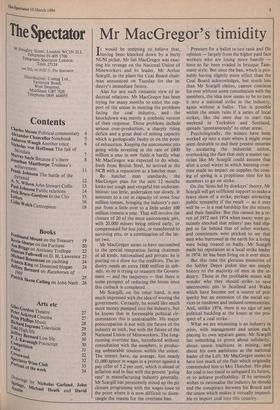Mr MacGregor's timidity
It would be tempting to believe that, having been knocked down by a burly NUM picket, Mr Ian MacGregor was exac- ting his revenge on the National Union of Mineworkers and its leader, Mr' Arthur Scargill, in the plans the Coal Board chair- man announced on Tuesday for the in- dustry's immediate future.
Alas for any such romantic view of in- dustrial relations. Mr MacGregor has been trying for many months to enlist the sup- port of the union in meeting the problems facing the coal industry, and the knockdown was merely a symbolic version of their response. Those problems include serious over-production, a sharply rising deficit and a great deal of mining capacity which is geologically faulty or on the point of exhaustion. Keeping the uneconomic pits going while investing at the rate of £800 million a year in new fields is hardly what Mr MacGregor was expected to do when, fresh from British Steel, he arrived at the NCB with a reputation as a hatchet man.
By hatchet man standards, the MacGregor plan for the next 12 months looks not tough and vengeful but underam- bitious: too little, undertaken too slowly. It amounts to a cut in capacity of some four million tonnes, bringing the industry's out- put from a little over to a little under 100 million tonness a year. That will involve the closure of 20 of the most uneconomic pits, with 20,000 miners being retired early, or compensated for lost jobs, or transferred to surviving pits, or a combination of the lat- ter two.
Mr MacGregor seems to have succumbed to the special temptation facing chairmen of all kinds, nationalised and private: he is putting on a show for the creditors. The in- dustry needs an extra £600 million in sub- sidy, so he is trying to reassure the Govern- ment — and the taxpayers — that there is some prospect of reducing the losses once this cutback is completed.
Mr Scargill, on the other hand, is not much impressed with the idea of wooing the government. Certainly, he would like much more money pumped into the industry, but he knows that in foreseeable political cir- cumstances this is unattainable. His major preoccupation is not with the future of the industry as such, but with the future of the National Union of Mineworkers. The long- running overtime ban, introduced without consultation with the members, is produc- ing unbearable tensions within the union. The miners have, on average, lost nearly £1,000 apiece in wages in a protest against a pay offer of 5.2 per cent, which is ahead of inflation and in line with the present 'going rate' in manufacturing industry generally. Mr Scargill has persistently mixed up the pit closure programme with the wages issue to the point where it is now difficult to disen- tangle the reason for the overtime ban. Pressure for a ballot to test rank and file opinion — largely from the higher paid face workers who are losing more heavily have so far been evaded in brusque Tam- many style. But since the ban, which is pro- bably having slightly more effect than the Coal Board acknowledges, but much less than Mr Scargill claims, cannot continue for ever without some consultation with the members, the idea now seems to be to turn it into a national strike in the industry, again without a ballot. This is possible within the union rules if a series of local strikes, like the ones due to start this weekend in Yorkshire and Scotland, spreads 'spontaneously' to other areas.
Psychologically, the miners have been worked up into a state where it might even seem desirable to end their present miseries by escalating the industrial action, overlooking the flaw that only a master tac- tician like Mr Scargill could assume that after a cruel winter in which banning over- time made no impact on supplies the com- ing of spring is a propitious time for his members to go on strike.
On the 'lions led by donkeys' theory, Mr Scargill will get sufficient support to make a brave show of a strike, perhaps attracting public sympathy if the result — as it may well be — is a real hardship for the miners and their families. But this cannot be a re- run of 1972 and 1974 when many were ge- nuinely shocked that miners' pay had slip- ped so far behind that of other workers, and consciences were pricked to see that men who burrowed in the earth for a living were being treated so badly. Mr Scargill made his reputation as a local strike leader in 1974: he has been living on it ever since.
But this time the glorious memories of the Saltley Depot picket line are simply history to the majority of men in the in- dustry. Those in the profitable mines will wonder why they should strike to save uneconomic pits in Scotland and Wales which have become not a source of pro- sperity but an extension of the social ser- vices in rundown and isolated communities. And, unlike 1974, there is no sign of any political buckling at the knees at the pro- spect of a coal strike.
What we are witnessing is an industry in crisis, with management and union each playing its own separate game. Mr Scargill has something to prove about solidarity, about union traditions in mining, and about his own ambitions as the national leader of the Left. Mr MacGregor seems to have lost much of the flair which originally commended him to Mrs Thatcher. His plan for coal is too timid to safeguard its future, or to achieve profitability. If he seriously wishes to rationalise the industry he should end the conspiracy between his Board and the union which makes it virtually impossi- ble to import coal into this country.






































 Previous page
Previous page